SRM-AP All News
ALL News
- Sai Harshini from the class of 2022 gets placed at AB InBev August 3, 2021
 Yadlapalli Sai Harshini, a student from the Department of Computer Science & Engineering has received a mesmerizing job offer from the world’s largest brewing company, AB InBev, in the Engineering Campus Placement for the class of 2022. She will soon start working at the Global Capability Centre located in Bangalore with a CTC of 12LPA.
Yadlapalli Sai Harshini, a student from the Department of Computer Science & Engineering has received a mesmerizing job offer from the world’s largest brewing company, AB InBev, in the Engineering Campus Placement for the class of 2022. She will soon start working at the Global Capability Centre located in Bangalore with a CTC of 12LPA.The first shortlisting round was an online test with multiple-choice questions on aptitude, domain knowledge, and coding; followed by a group discussion. The third round was a technical interview based on the resume, followed by an HR interview.
In the words of Sai Harshini:
I am so happy to receive the offer from the world’s largest beverage and brewing company, AB InBev. The inclusion of Industry Standard Coding Skills & Industry Standard Employability Skills courses in the curriculum right from the first semester has helped me hone my coding and communication skills continuously. The projects I’ve done and my research publications with Dr Manikandan have made me stand out from the crowd. The extra-curricular activities at the university I’m part of, Student Council and Social Media Ambassadors, helped me understand perspectives, gain morale, exposure to working in a team and social skills.
The resources provided, sessions before the recruitment drive and the talks with our seniors organised by the CR & CS department helped me get an idea of how the process is going to be and what I need to be prepared for. Thanks to the CR&CS department, the CCC team, and all my mentors. My advice to my peers and juniors is to not worry about what you don’t have, instead be confident and ready to justify what you have. That’s what I’ve done.
The Department of Corporate Relations & Career Services (CR&CS) at SRM University-AP interacts closely with the industry to make the university a favoured destination for national and international organisations looking to recruit fresh talent. The CR&CS Department, SRM University-AP, considers the placement process very crucial and extends every kind of support to ensure that the students are given the best opportunities to streamline their career interests.
Continue reading → - Students underpinned by CR&CS secure jobs in Bajaj Finserv Ltd. August 3, 2021
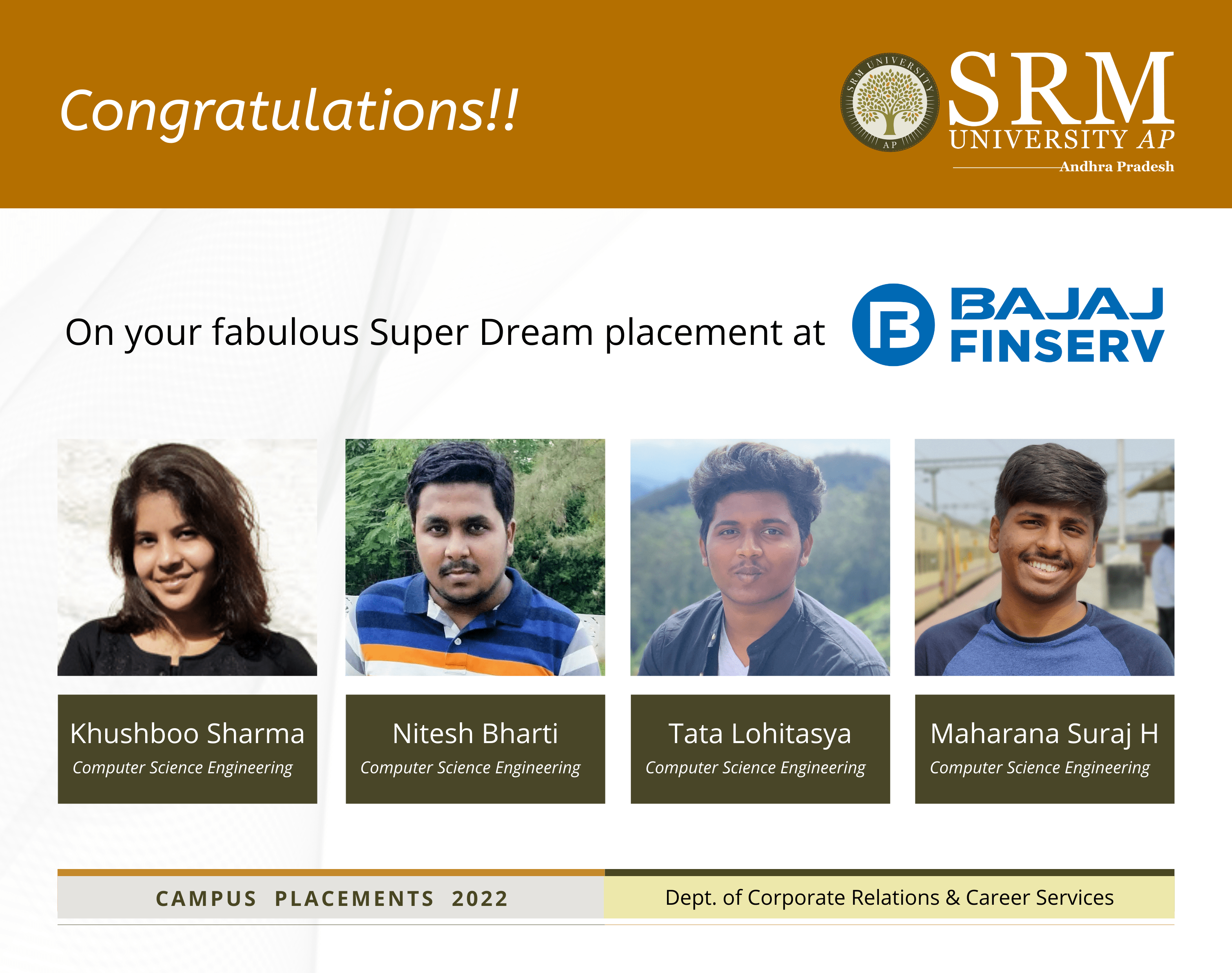 Maharana Suraj Harihar, Nitesh Bharti, Tata Lohitasya, Khushboo Sharma are four undergraduates from the Department of Computer Science and Engineering who have got placed with the financial services company Bajaj Finserv Ltd. in the Engineering Campus placements for the class of 2022. They will be working in the headquarters of the company in Pune.
Maharana Suraj Harihar, Nitesh Bharti, Tata Lohitasya, Khushboo Sharma are four undergraduates from the Department of Computer Science and Engineering who have got placed with the financial services company Bajaj Finserv Ltd. in the Engineering Campus placements for the class of 2022. They will be working in the headquarters of the company in Pune.Bajaj Finserv Limited is a part of Bajaj Holdings & Investments Limited, a leading financial services company focused on wealth management, insurance, lending, and asset management. Being India’s fastest-growing and most diversified non-banking financial corporation, the company gives opportunity to fresh graduates to build their careers.
The first shortlisting round was Application Programming Interfaces (API) test and it was followed by the second round of coding with multiple-choice questions. The third round was the technical interview based on the projects that the students have done and their major achievements during the course. Questions related to data access and algorithm, technologies like eCommerce development and blockchain were also asked.
Nitesh Bharti, one of the placed students, says that he was rejected in so many interviews and couldn’t even clear the coding tests many times. “My persistent efforts with the support of the CR&CS department have finally paid off well. The mock interviews, industry readiness webinars, practical sessions to polish coding skills have been really helpful. Dr Ajay, Dr Manikandan and Dr Priyanka from the CSE department are my mentors and I cannot overlook their guidance and support”, said the overjoyed Nitesh. “The projects that I did as part of studies – One related to Covid-19 analysis and one DBMS project related to the e-voting system- helped me a lot in cracking the interview. My advice to juniors who are to attend placement interviews is that never lose hope”, he added.
Tata Lohitasya, another student thanks to the support of the placement team that has been very resourceful and the separate orientation sessions conducted for different companies. “Subjects like ISCP and training by CCC have been very helpful. The CR&CS department has been very approachable throughout the process”, said Tata. “The SRM AP faculty have helped me to create a strong base on conceptual topics. Dr Murali Krishna, Dr Ashok Kumar, and Dr Amit Kr Mandal from the department of CSE are my mentors”, he added.
Continue reading → - Dr Nimai Mishra’s research group studies new surface capping ligands August 2, 2021
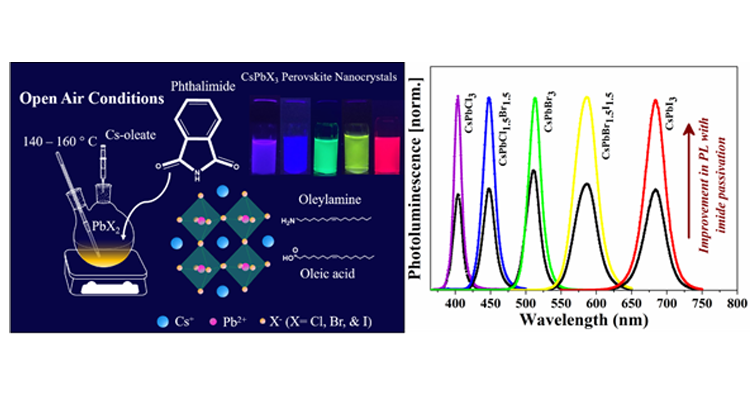 Dr Nimai Mishra, Assistant Professor, Department of Chemistry, SRM University-AP, Andhra Pradesh, along with his research group pursuing PhD under him-Ms V.G.Vasavi Dutt and Mr Syed Akhil- have published a research article titled “Enhancement of Photoluminescence and Stability of CsPbX3 (X= Cl, Br, and I) Perovskite Nanocrystals with Phthalimide Passivation” in the Journal “Nanoscale” (The Royal Society of Chemistry, Impact Factor-7.8).
Dr Nimai Mishra, Assistant Professor, Department of Chemistry, SRM University-AP, Andhra Pradesh, along with his research group pursuing PhD under him-Ms V.G.Vasavi Dutt and Mr Syed Akhil- have published a research article titled “Enhancement of Photoluminescence and Stability of CsPbX3 (X= Cl, Br, and I) Perovskite Nanocrystals with Phthalimide Passivation” in the Journal “Nanoscale” (The Royal Society of Chemistry, Impact Factor-7.8).Caesium lead halide perovskite nanocrystals (CsPbX3 NCs) have been the flourishing area of research in the field of photovoltaic and optoelectronic applications because of their excellent optical and electronic properties. However, they suffer from low stability and deterioration of photoluminescence (PL) properties post-synthesis. One of the ways to minimize the surface defects in the surface treatment with suitable ligands is to achieve the NCs with superior PL properties for light-emitting applications.
In this article, Dr Mishra’s research group demonstrates that incorporating an additional ligand can further enhance the optical properties and stability of NCs. Here, we introduced phthalimide as a new surface passivation ligand into the oleic acid/oleylamine system in situ to get near-unity photoluminescence quantum yield (PLQY) of CsPbBr3 and CsPbI3 perovskite NCs. We observed, phthalimide passivation dramatically improves the stability of CsPbCl3, CsPbBr3, and CsPbI3 NCs under ambient light and UV light. The PL intensity is recorded for one year which showed a dramatic improvement for CsPbBr3 NCs. Nearly 11% of PL can be retained even after one year for phthalimide passivated samples, on the other hand, the PL of as-synthesized NCs completely diminishes in four months. CsPbCl3 NCs exhibit 3 times higher PL with phthalimide and retain 12% PL intensity even after two months while PL of as-synthesized NCs completely diminishes by then. Under continuous UV light illumination, the PL intensity of phthalimide passivated NCs is well preserved while the as-synthesized NCs exhibit negligible PL emission in 2 days. About 40% and 25% of initial PL is preserved for CsPbBr3 and CsPbCl3 NCs in the presence of phthalimide. CsPbI3 NCs with phthalimide exhibit PL even after 2 days while the PL is rapidly declined for as-synthesized NCs in the first 10 hours. The presence of phthalimide in CsPbI3 NCs could maintain stability even after a week while the as-synthesized NCs under transition to non-luminescent phase within 4 days.
Furthermore, blue, green, yellow, and red-emitting diodes by using CsPbCl1.5Br1.5, CsPbBr3, CsPbBr1.5I1.5, CsPbI3 NCs respectively are fabricated by drop-casting NCs onto blue LED lights which show the great potential of the use of these phthalimide passivated NCs in the field of display and light technologies.
Read the full paper here: https://pubs.rsc.org/en/content/articlelanding/2021/nr/d1nr03916d
Continue reading → - DRDO Chairman Dr Satheesh Reddy meets the leaders of SRM University-AP August 2, 2021
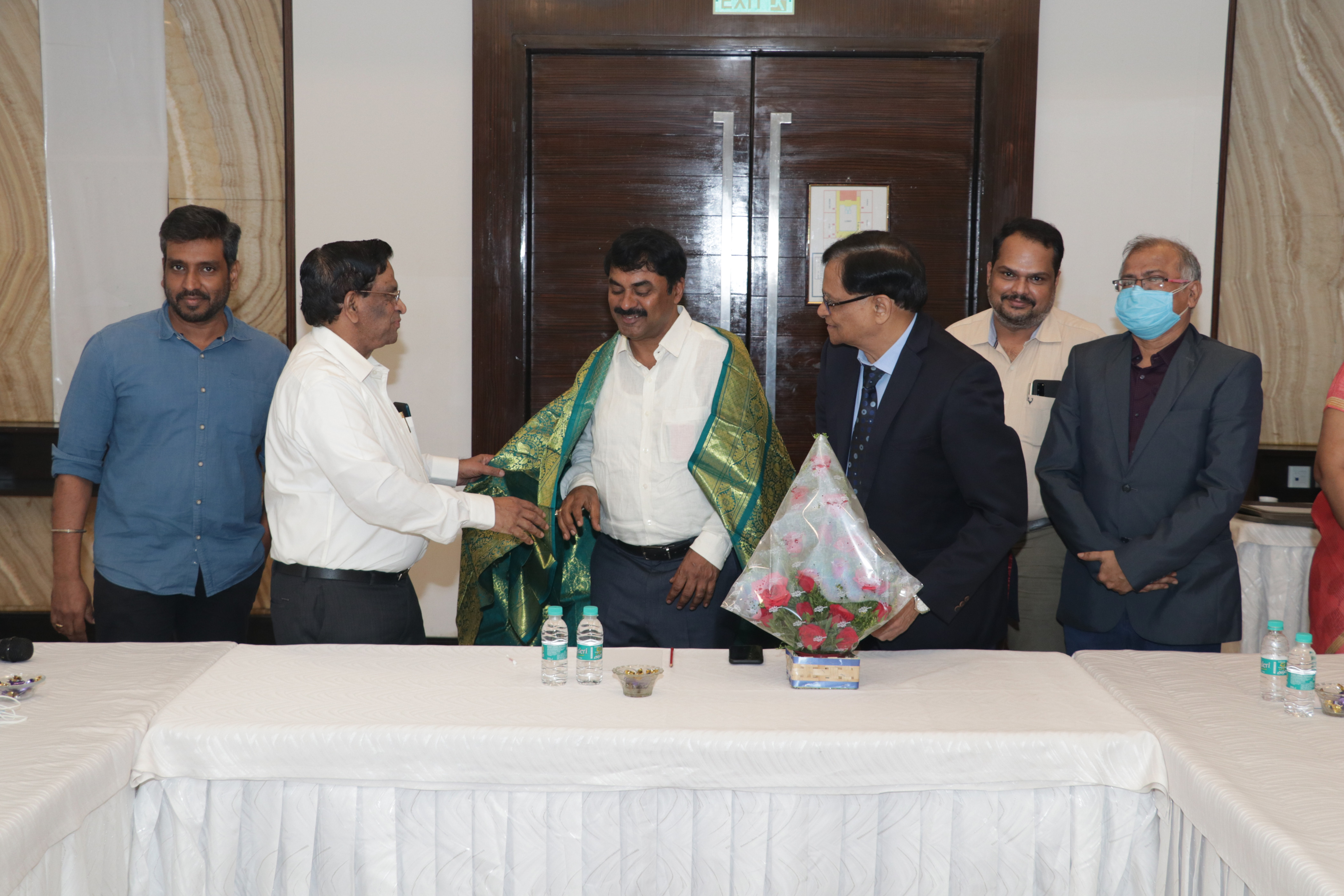 Dr G. Satheesh Reddy, Chairman, DRDO had an interactive meeting with the leaders of SRM University-AP on July 25, 2021. Prof V.S. Rao, Vice-Chancellor and Prof D. Narayana Rao, Pro-Vice-Chancellor of SRM University-AP felicitated Dr Satheesh Reddy for his glorious technological contributions to India.
Dr G. Satheesh Reddy, Chairman, DRDO had an interactive meeting with the leaders of SRM University-AP on July 25, 2021. Prof V.S. Rao, Vice-Chancellor and Prof D. Narayana Rao, Pro-Vice-Chancellor of SRM University-AP felicitated Dr Satheesh Reddy for his glorious technological contributions to India. Prof Ranjit Thapa from the Department of Physics made a presentation on the Computational Materials Genome project to Dr Satheesh Reddy. He emphasized the importance and significance of the Computational Materials Genome project and how it is useful to accelerate the design, development, discovery of new functional materials many times and at a minimal cost compared to the existing traditional methods. During his presentation, he explained the development of catalysts using QM/ML approaches, the development of explosophores, and computational fluid dynamics on external aerodynamics on Earth and Mars. Dr Satheesh Reddy was impressed with the presentation and suggested contacting DRDO-Young Scientist Laboratory related to Smart Materials in Hyderabad for experimental collaborations. He advised Dr Sathya Pramod to discuss computational models with the Scientists who are working on hypersonic wind tunnels deployed in DRDL, Hyderabad.
Prof Vinod Kumar presented a proposal on foams based on Aluminium and Magnesium. He explained the processing, structure, morphology, and applications of these metal forms. Dr Satheesh Reddy advised looking into titanium-based metal forms also. Later, Dr Jasvinder Singh presented his work on cardiovascular stents fabricated by solvent cast 3D printing. Dr Satheesh Reddy has shown keen interest and he has asked for a copy of the presentation and other details for further study.
Dr Satheesh Reddy assured collaboration with SRM University-AP on a few projects that are relevant to the needs of DRDO. He elaborated on the following initiatives of DRDO.
Continue reading →
1. DRDO will fund the incubation centres which work on defence-related problems by freshly graduated BTech students with the financial assistance of up to Rs 1 crore. Further, if the fresh graduates come forward as industrial partners, DRDO could provide financial assistance of up to 10 Crores INR.
2. DRDO has also started joint PhD programmes with universities/institutions in India. DRDO scientists will act as co-guides and registered PhD students will get an opportunity to work in DRDO labs during the tenure.
3. DRDO has started MTech programmes in Defence Technologies jointly with the universities. In this programme, students will complete the course work in the university and in the second year, students can do their project work in the DRDO labs.
4. DRDO is also interested in supporting long-term projects with the Universities under the Directed Research programme which could be supported by DRDO for a long-term of two or three decades. - Ganji Harikrishna earns a dream offer of 17 LPA at Zuora July 29, 2021
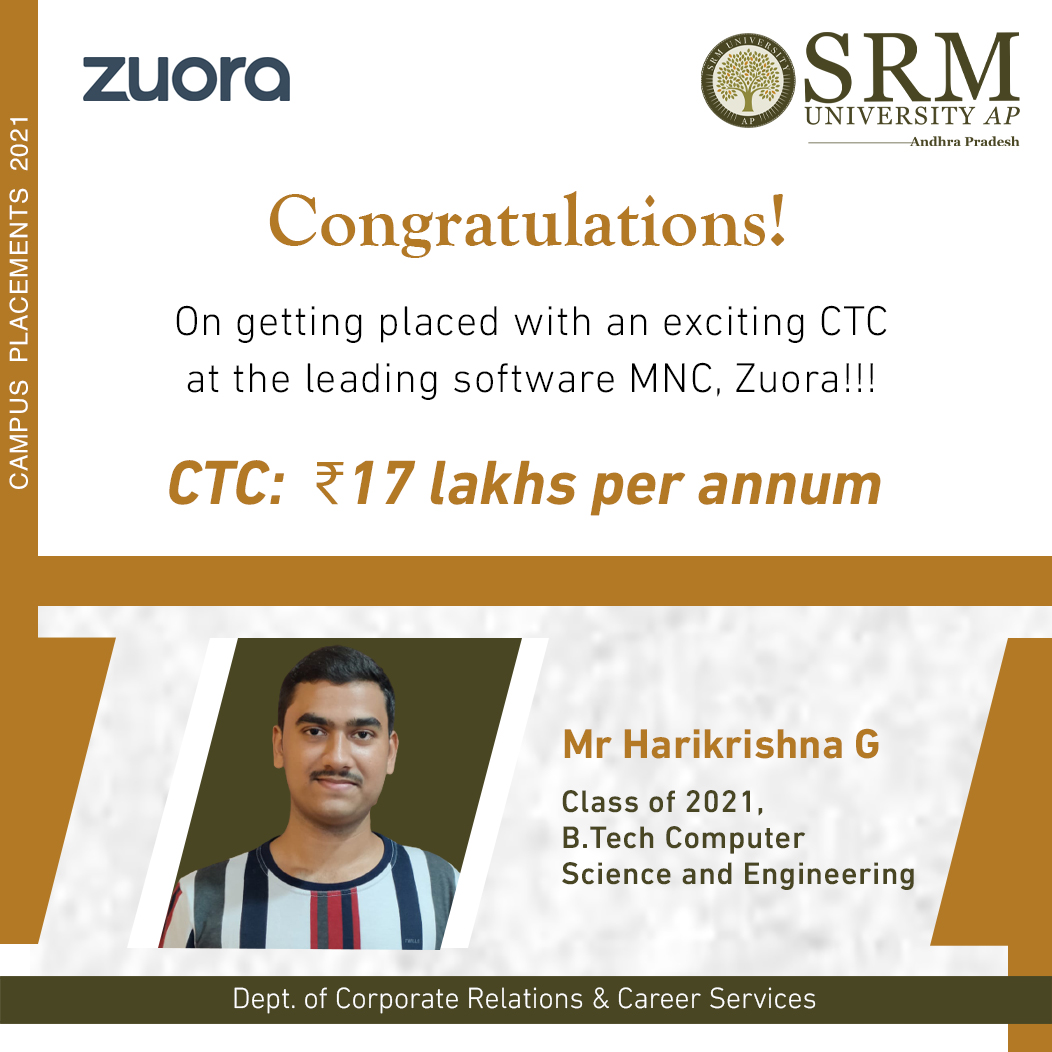 The maiden graduates of SRM University-AP have secured 100 per cent placements in the campus recruitment drive where 500+ reputed companies from India and abroad visited our university. More than 70 per cent of the students successfully bagged the dream and super dream offers. Ganji Harikrishna, a CSE graduate, received a dream offer with a salary package of 17 lakhs per annum from ZUORA, a leading software MNC. He joined as a full-time Senior Development Engineer (SDE) and would work in their Chennai office.
The maiden graduates of SRM University-AP have secured 100 per cent placements in the campus recruitment drive where 500+ reputed companies from India and abroad visited our university. More than 70 per cent of the students successfully bagged the dream and super dream offers. Ganji Harikrishna, a CSE graduate, received a dream offer with a salary package of 17 lakhs per annum from ZUORA, a leading software MNC. He joined as a full-time Senior Development Engineer (SDE) and would work in their Chennai office.Student Testimonial
SRM AP is a great place to learn new things and what makes me excited about it is the excellent group of faculty and state-of-art infrastructure. Faculty at SRMAP are from reputed academies spread in and outside the country, and they are highly interactive with students. The training and placement cell organises personality development programmes, group discussions, mock interviews with industry experts, and personality development training sessions for the candidates. The all-round development training made me confident to face the challenges associated with interviews. Besides the aptitude and soft skills training, SRM AP provides CCC training for those who are very good at Computer Science Fundamentals and Coding. The curriculum followed by CCC was great and they were interactive with the students in clarifying their doubts in coding and as well as further rounds of interviews.
There was great motivation from the Corporate Relations and Career Services Department and faculty members. They trained me with the tips to clear the interview. I appreciate the efforts made by the CRCS department in bringing such top MNC’s like AMAZON, PAYPAL, AB InBev etc. Faculty members worked very hard for the success of each student, especially our HOD, Dr Raghunathan has been of firm support to all things associated with the CSE Department.
Continue reading → - Undergraduates bring off one more patent to SRM University-AP July 27, 2021
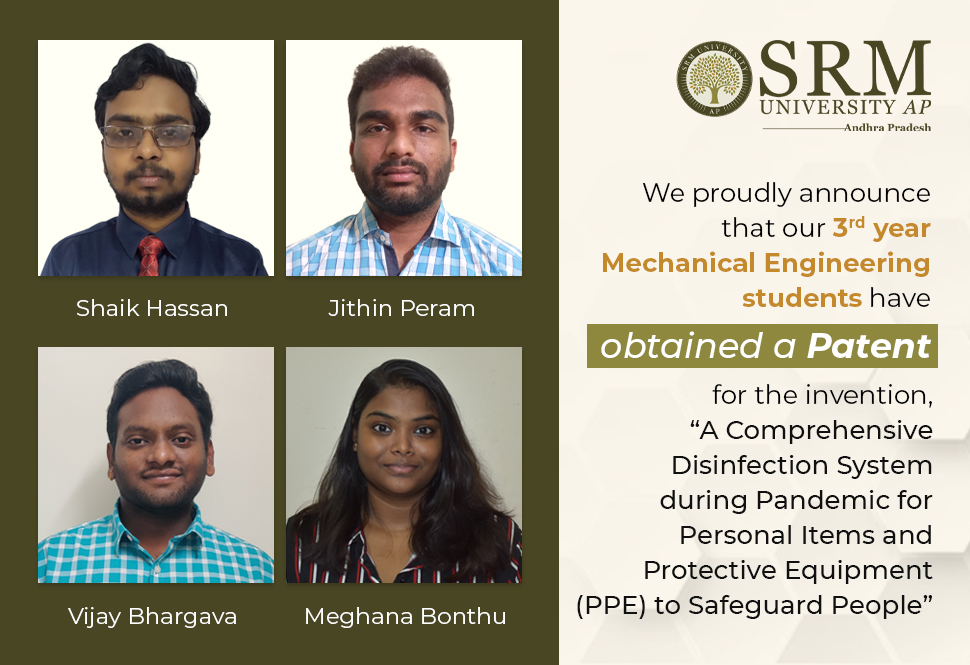 Young researchers from Mechanical Engineering- S.K Hassan, M.Vijaya Bhargava, Jithin Peram, and Meghana Bonthu- have added one more laurel to SRM University-AP by inventing something novel! Under the supervision of faculty from the Department of Mechanical Engineering, the quartet have published a patent A Comprehensive Disinfection System during Pandemic for Personal Items and Protective Equipment(PPE) to Safeguard People.
Young researchers from Mechanical Engineering- S.K Hassan, M.Vijaya Bhargava, Jithin Peram, and Meghana Bonthu- have added one more laurel to SRM University-AP by inventing something novel! Under the supervision of faculty from the Department of Mechanical Engineering, the quartet have published a patent A Comprehensive Disinfection System during Pandemic for Personal Items and Protective Equipment(PPE) to Safeguard People.The current Covid-19 pandemic has led to an enormous demand for gadgets/objects for personal protection. To prevent the spread of the virus which proliferates also through surface transmission, it is important to disinfect objects of common use. One of the ways suggested is to use a UV-C disinfecting box that is efficient and effective in deactivating the COVID-19 virus. The novelty of the product prototype is the use of a UVC transparent material (fused silica quartz glass tubes). This not only physically supports the objects to be disinfected but also improves the effectiveness of disinfection. The aluminium foil which the students have used, a UV reflecting material, was used as the inner lining of the box for effective utilization of the UVC light emitted by the UVC lamps. Care has been taken to prevent leakage of UVC radiation out of the system. COVID-19 virus can be inactivated in 5 minutes by UVC irradiation in this disinfection box.
This novel product can help in efficiently sanitizing normal household items such as mobile phones, keys, purses, grocery and also PPE kits (masks, gloves, visors etc.). This product is not only affordable but also makes disinfection faster. Moreover, the operational process is simple – open the door, place the objects, turn it on and then retrieve them sanitised within minutes.
“We are looking forward to taking up this UV Box to the next stage of implementation with a more compact and more efficient mechanism”, says the proud team behind the invention. “We are ready to undertake new projects and with the help and support from Dr Venkat Nori and other faculty members”, they added.
Link to patent document: https://ipindia.gov.in/writereaddata/Portal/IPOJournal/1_4971_1/Part-1.pdf
Continue reading → - SRM University- AP ranked as the second Top Emerging Engineering Institute July 27, 2021
SRM University-AP, Andhra Pradesh has been ranked second among Top Emerging Engineering Institute – Telangana & AP in the Times Engineering Institute Ranking Survey 2021. The research aimed to arrive at a list of top engineering colleges offering full-time courses, including four-year courses in Telangana and Andhra Pradesh.
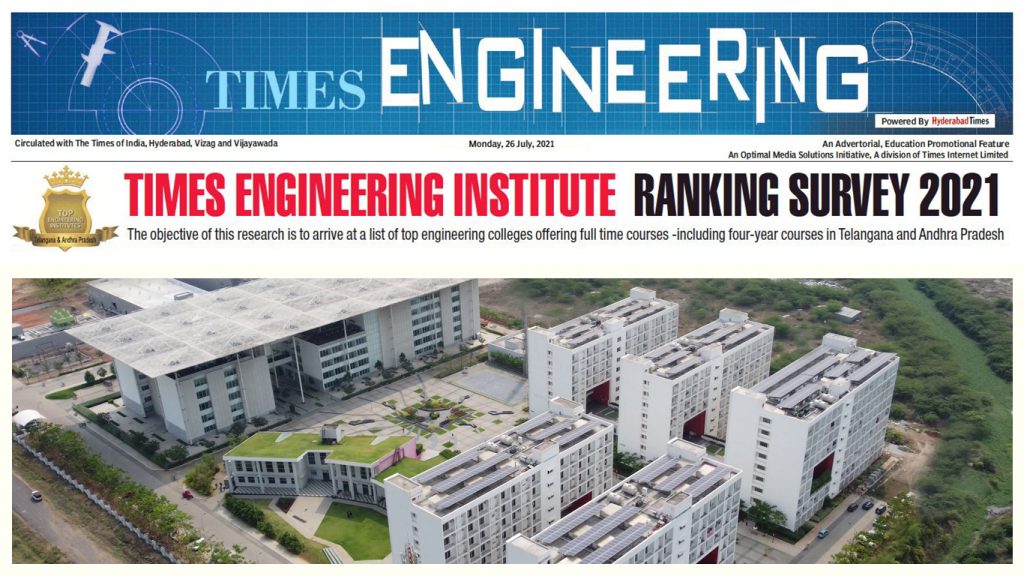 Designed by the renowned American builders Perkins + Will, SRM University-AP is a healthy, sustainable place to live, learn, work, play, and pursue research. The university offers various engineering, sciences, social sciences, entrepreneurial and management courses through its 17 departments spread across three schools. The campus is adorned with state-of-the-art labs equipped with cutting edge technology, 6 wifi enable hostels for 1500 students, a dining area with 1000 seating, an auditorium with 1000 seating capacity, a library with 100000+ books and offline/online subscriptions and many more.
Designed by the renowned American builders Perkins + Will, SRM University-AP is a healthy, sustainable place to live, learn, work, play, and pursue research. The university offers various engineering, sciences, social sciences, entrepreneurial and management courses through its 17 departments spread across three schools. The campus is adorned with state-of-the-art labs equipped with cutting edge technology, 6 wifi enable hostels for 1500 students, a dining area with 1000 seating, an auditorium with 1000 seating capacity, a library with 100000+ books and offline/online subscriptions and many more.SRM University-AP offers best in class education with the ‘Interdisciplinary Experiential Active Learning’ (IDEAL) curriculum, ‘Undergraduate Research Opportunities Project’ (UROP), Capstone Projects and Industry Internships. In view of the latest trends and industry demands, SRM University-AP’s pedagogical system was initially designed in partnership with MIT and has evolved to meet the changing needs of education.
Our students are offered exposure and global educational and entrepreneurship experience through the Semester abroad programme with UC Berkeley, University of Wisconsin-Madison, Northeastern University, Asia University-Taiwan, EFREI-France, Flinders University-Australia and others. We further offer a Unique Twinning Programme with IIT-Chicago for our engineering students, where they will pursue their initial two years in SRM AP and final two years on the IIT-Chicago campus.
The bright and brilliant maiden batch of SRM University-AP has secured 100% Placement. The very talented twins Rajarshi and Saptarshi Mazumder are offered international placements with PVP Inc, a strategic partner of Google Japan with an attractive package of 50 LPA. 71% of our students were placed with Dream and Super Dream offers. Computer Science and Engineering branch earned an average pay package of 8 LPA and other engineering branches secured an average package of 7 LPA in the Campus Placement Drive 2021. Our top recruiters include Amazon, Paypal, Bank of America, Standard Chartered Bank, Infosys, TCS to name a few.
The Innovation, Design and Entrepreneurship Academy (IDEA) of SRMAP is actively engaged to mould the leaders of tomorrow. The Hatchlab Research Center (TBI of SRM AP) is currently facilitating the incubation of 40+ student startups with 200+ industry mentors. Our student venture OurEye.ai has received a $120,000 angel investment. In addition, 10,000+ sqft, state of the art incubator space along with Seed funding are provided to every eligible student venture.
SRM University-AP puts an emphasis on quality research to serve society. Consequently, the nascent University has published 500+ research papers in high impact Scopus indexed journals, including Nature Communications. The University has filed/published 22 patents and working on 35 research projects with an outlay of 17.49 crores. The students have developed nature-friendly e-bike and face shields with biodegradable elements and received copyright from Indian Patent Office. SRM University-AP further promotes student-run labs such as Next-Tech Lab, Ennovab where students share their ideas to curate those into applications to benefit society.
To know more:
Survey ReportEmbarking on avenues of excellence
Continue reading → - NEP-2020 to provide Holistic, Student-Centric, Flexible and Multidisciplinary Education July 26, 2021
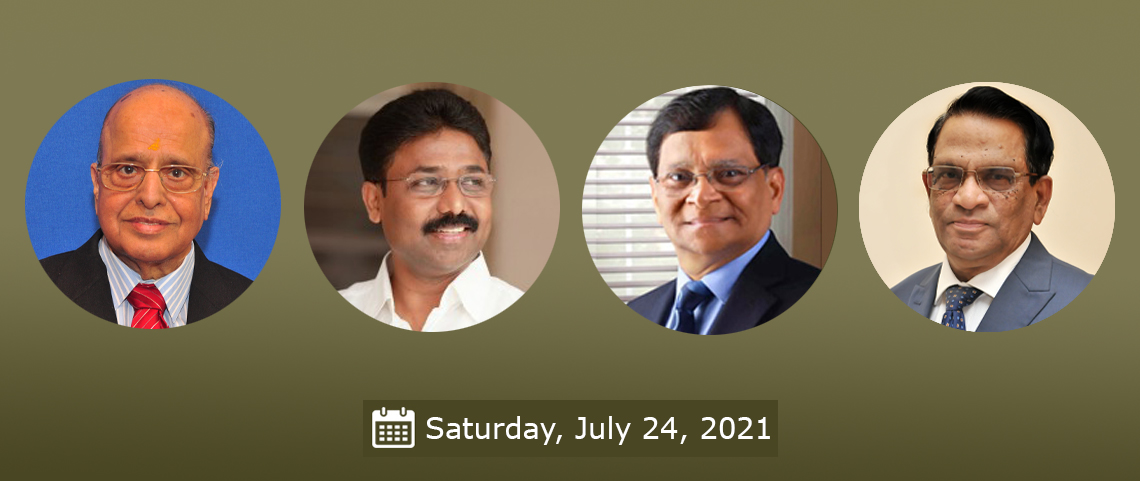 On July 29, 2020, the National Education Policy 2020 (NEP 2020), came into force by the Government of India. SRM University-AP organised a sought after webinar titled “Creating a Vibrant Knowledge Society – An Indian Strategy for 21st Century” on July 24, 2021, as a part of its University Distinguished Lecture Series. Padma Vibhushan Dr K Kasturirangan, Chairman, National Education Policy-2020 (NEP), expounded the salient features and importance of the National Educational Policy. Dr Audimulapu Suresh, Hon’ble Minister for Education, Andhra Pradesh, and Prof Vijayalakshmi Saxena, General President, ISCA, delivered special addresses.
On July 29, 2020, the National Education Policy 2020 (NEP 2020), came into force by the Government of India. SRM University-AP organised a sought after webinar titled “Creating a Vibrant Knowledge Society – An Indian Strategy for 21st Century” on July 24, 2021, as a part of its University Distinguished Lecture Series. Padma Vibhushan Dr K Kasturirangan, Chairman, National Education Policy-2020 (NEP), expounded the salient features and importance of the National Educational Policy. Dr Audimulapu Suresh, Hon’ble Minister for Education, Andhra Pradesh, and Prof Vijayalakshmi Saxena, General President, ISCA, delivered special addresses.Prof. D. Narayana Rao, Pro-Vice-Chancellor, SRM University – AP in his welcome address said that the NEP – 2020 laid the foundation for a new India of the 21st Century. He said that NEP is poised to yield outstanding results in the fields of Higher Education, Research, Innovation and Science & Technology Development in the country. Prof. Narayana Rao said that NEP 2020 is a game-changer for education in the country. He also opined that no country has achieved self-reliance without education of high quality.
In his Distinguished Lecture, Dr Kasturirangan asserted that over the next decade, India would have the highest population of young people in the world, more than 50% below the age of 35 years aspiring for high-quality education.
“How to learn? Moreover, how to become lifelong learners?-This is a critical question that needs to be addressed appropriately. Furthermore, the education of the future generations needs to be reconfigured to meet the targets of the sustainable development goals set for the year 2030. Especially goals for quality education seek higher inclusion, equitable quality education and promotion of lifelong learning opportunities for sustainable economic growth, full and productive employment and decent work for all,” explained Dr Kasturirangan.
Dr Kasturirangan further delineated, “India now needs an education system aligned with the aspirational goals of the 21st century while remaining rooted to India’s values, systems and ethos. NEP-2020 is crafted to provide an integrative yet flexible approach to education, keeping the interconnections of various phases of education. NEP-2020 is an end-to-end educational roadmap for the country with a broad view of encompassing holistic development, kindling the true potentials of the individuals. The policy is designed in accordance with developmental, cognitive and educational psychology, indicating that 5+3+3+4 design is better suited to a child’s learning trajectory.”
Dr Kasturirangan further explained the role of universities, degree colleges, the importance of open and distance education and the role of teachers. Teachers are the pillars of the successful implementation of NEP-2020. The new policy has facilitated the teachers and revised their roles to achieve the goal.
The major emphasis given in the policy is to the aspect of holistic and multidisciplinary education as the fundamental component of every level of education. Universities are perennial sources to generate and disseminate new ideas and knowledge. These are the effective eco-systems for interactions among diverse disciplines. He further requested SRM University-AP to consider setting up a Centre of Excellence in Education to offer B.Ed and M.Ed courses to prepare teachers.
Dr Kasturirangan said that the teachers trained in universities amongst the passionate and high profile Professors, will be excellent teachers and excel in teaching. Thus, the Universities need to take the initiative of setting up Centres of Excellence in education. At the Post-graduation level, one of the key recommendations of the policy is the strengthening of the research at the university system. The policy recommends the creation of a National Research Foundations for the purpose. National Research Foundation came into being with the vision of increasing the quantum and scope of quality research across all disciplines, creating a much larger workforce in the country. It also aims to promote Indian Art, Culture and Languages.
The policy also highlights the critical need to manage research at all levels- pure, applied, transactional, and research addressed to specific needs of the industry and social objectives. The primary role of the National Research Foundation will be to nurture a vibrant research eco-system through adequate funding, mentoring and support of multidisciplinary research in Arts and Humanities, Social and Natural Sciences, Engineering and Technology, including educational technology. Dr K. Kasturirangan emphatically mentioned that India will be the skill capital of the world. He also mentioned that India must lead in emerging technologies: Artificial Intelligence, Additive Manufacturing, Neurosciences, e-mobility etc.
In his Presidential Address, Dr Adimulapu Suresh expressed his happiness to share the various initiatives that Government of Andhra Pradesh is taking towards implementing National Education Policy-2020. Dr Suresh said that the Government of Andhra Pradesh, under the leadership of Hon’ble Chief Minister Y S Jagan Mohan Reddy, has accepted the concept and recommendations of National Education Policy-2020 that it has envisaged.
Dr Suresh agreed that education should have equality, accessibility, affordability, accountability and reachability among all. In the 21st century, poverty can no longer be a barrier to education. Hence, the Government of Andhra Pradesh has introduced several novel programmes and schemes to bring education to everyone, and NEP-2020’s recommendations have aided to take their schemes forward.
The Government of Andhra Pradesh believes that mothers are the key to an educated family. Therefore, the Government has introduced an incentive programme for mothers. Every mother who sends her child to a school will get 15000 rupees from the Government of Andhra Pradesh. The Government has further introduced Full Fee Reimbursement for the students below poverty level.
Dr Suresh proclaimed, “People who were denied education for centuries now can find their voices. Not a single child will be denied education. Hence, the Government of Andhra Pradesh has allocated 17% of its budget, i.e. nearly thirty thousand crores, for education. We are currently spending 2-3% of GSDP for education which is very close to what has been prescribed in the NEP-2020. Following the recommendation of NEP-2020, The Government of Andhra Pradesh is also introducing Academic Banks of Credits (ABC) and Choice based credit system (CBCS) to provide students with freedom and flexibility in education.”
Dr Suresh further mentioned that NEP-2020 emphasises Higher Education but does not enlighten much on Primary Education. CM Y S Jagan Mohan Reddy has taken revolutionary steps to reconstruct Primary Education, developing the common curriculum and language training. Along with that, The Government is also putting an emphasis on Communicative and Soft Skill Training. Therefore, the Government of Andhra Pradesh can proudly say that that they have been the first state in the nation to imbibe the recommendations of National Education Policy-2020.
Dr Vijayalakshmi Saxena, in the Special Address, further elaborated that the previous policy on education was decades old. With the changing time, the policy also needs to be improvised. NEP-2020 has filled the void and came up with suggestions for the making of the 21st century. She said, “As educators, it is our duty to bring youngsters to take up new challenges. The vision of Indian Education, as mentioned in the policy, is to touch everyone’s life, consistent with their needs and necessities. she concluded.
Prof D Narayana Rao, Pro-Vice-Chancellor presented the book – Space and Beyond: Professional Voyage of K. Kasturirangan, to the Hon’ble Minister, and mementoes to all the speakers.
In his concluding remarks, Prof VS Rao, Vice-Chancellor of SRM University-AP, congratulated Dr Kasturirangan for the brilliantly conceptualized new education policy. He agreed with Dr Kasturirangan to the need of having a dedicated centre for the advancement of education. Prof Rao announced the inception of the Centre of Educational Innovation and Excellence that SRM University-AP has envisaged in the near future.
Continue reading → - CSE students complete Semester Abroad Programme at UC Davis July 26, 2021
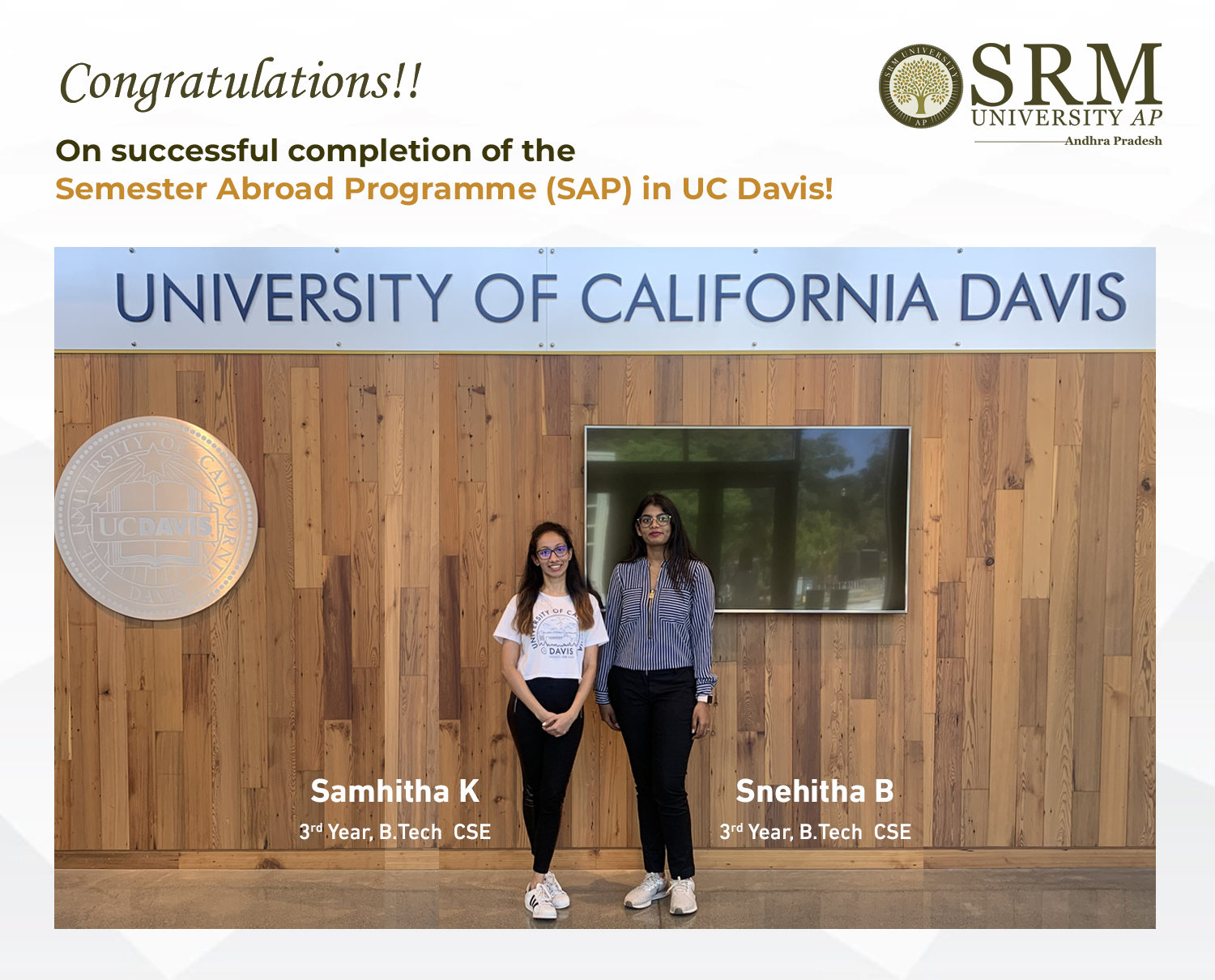 Barukula Snehitha Naga Sai and Kamma Samhitha are two brilliant third-year Computer Science Engineering students selected for the enviable Semester Abroad Programme (SAP) at the University of California, Davis. The students received a partial scholarship from SRM University-AP to complete their final semester abroad with the global study programme at UC Davis. The selection process for the semester abroad programme generally starts at the end of the 3rd and 5th semesters when our university carries out student interviews. A minimum of 8.7 CGPA is required to be eligible for the SAP scholarship and the programme focuses on building engineering design processes along with developing behavioural and communication skills of meritorious students.
Barukula Snehitha Naga Sai and Kamma Samhitha are two brilliant third-year Computer Science Engineering students selected for the enviable Semester Abroad Programme (SAP) at the University of California, Davis. The students received a partial scholarship from SRM University-AP to complete their final semester abroad with the global study programme at UC Davis. The selection process for the semester abroad programme generally starts at the end of the 3rd and 5th semesters when our university carries out student interviews. A minimum of 8.7 CGPA is required to be eligible for the SAP scholarship and the programme focuses on building engineering design processes along with developing behavioural and communication skills of meritorious students.The Study Abroad Programme provided Snehitha and Samhitha with the opportunity to cooperate with industrial designers. For practical hands-on experiences, Snehitha worked for the UC Davis school of nursing. Besides that, UC Davis promotes a variety of student clubs and technical programmes that bring students from all over the world together. This opportunity also helped students to live in a new culture and travel through different cities abroad. Prof Ragunathan and Dr Priyanka from the Department of Computer Science and Engineering constantly supported the students throughout their semester abroad journey at UC Davis.
For engineering graduates, technical skills and hands-on experience with industry is inevitable. SRM University-AP ensures that every student grabs opportunities to excel in their respective disciplines.
Snehitha extended her gratitude to all her professors at SRM University-AP who guided her to this achievement. “I really appreciate the curriculum structure at SRM AP that offers us practical knowledge rather than forcing us to memorise theories. The concrete understanding of the subject aided me greatly in learning about real-world problems, and accomplish this dream of studying a semester abroad”, she said.
This programme has taught me how to be adaptable, resilient and above all, how to make the best use of resources available. I have been and am fortunate to study from the best professors, both at SRM AP and UC Davis”, said Samhitha.
Continue reading → - Assessing the benefits of irrigation against heat stress in agriculture July 24, 2021
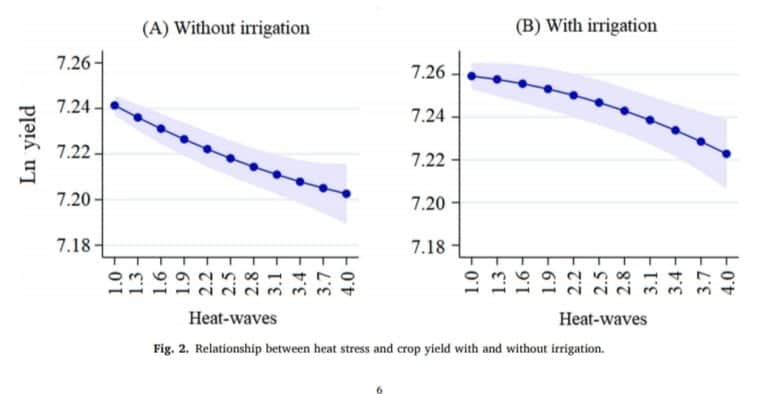 Heat stress negatively affects crop yield and its impact has increased over time. Researchers in India study this situation with utmost priority. Consequently, Dr Ghanshyam Kumar Pandey, Assistant Professor in the Department of Economics at SRM University-AP has co-authored a paper with Pratap S Birthal and et. al titled “Benefits of irrigation against heat stress in agriculture: Evidence from wheat crop in India” in the journal Agricultural Water Management, Vol 255, having an Impact factor 4.02.
Heat stress negatively affects crop yield and its impact has increased over time. Researchers in India study this situation with utmost priority. Consequently, Dr Ghanshyam Kumar Pandey, Assistant Professor in the Department of Economics at SRM University-AP has co-authored a paper with Pratap S Birthal and et. al titled “Benefits of irrigation against heat stress in agriculture: Evidence from wheat crop in India” in the journal Agricultural Water Management, Vol 255, having an Impact factor 4.02.Applying the fixed effects regression technique to the highly spatially disaggregated district-level data from 1966–67 to 2011–12. This paper has assessed the impact of heat stress on wheat production in India and concurrently evaluated the role of irrigation in offsetting its harmful impact. The study has brought out three key highlights:
(i) Heat stress negatively impacts crop yield, and the impact has increased over time.
(ii) Irrigation, besides its contribution towards improving crop yield, also moderates the harmful impact of heat stress, but over time its effectiveness has declined.
(iii) The measure of heat stress built on multiple aspects of excess temperature (i.e., intensity, persistence, and frequency) explains variation in crop yield better than working on a single aspect of it.Given the increasing scarcity of irrigation water and rising temperature, these findings suggest the need for exploring technological and policy options for improving irrigation water use, efficiency, and breeding of crops for heat tolerance and low water footprints.
This research paper is written in collaboration with ICAR-National Institute of Agricultural Economics and Policy Research, PUSA, New Delhi. Dr Ghanshyam’s future projects are focused on climate change and agriculture, and the effect of climate change on the livestock sector in India.
Read the full paper here: https://doi.org/10.1016/j.agwat.2021.106950
Continue reading →

